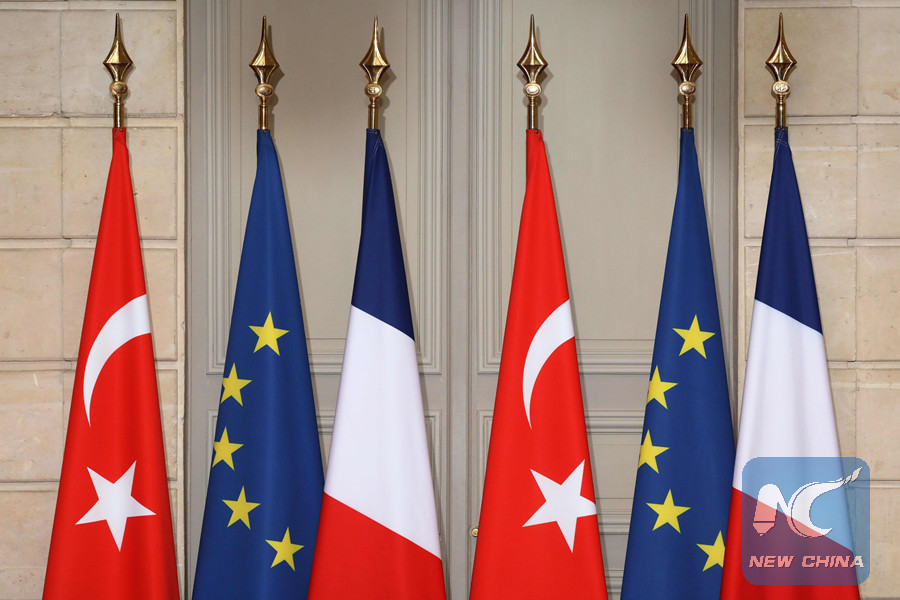
The picture shows the flags of Turkey, France and the European Union during a joint press conference of the French and Turkish presidents on Jan. 5, 2018 at the Elysee Palace in Paris. (AFP photo)
ISTANBUL, Jan. 11 (Xinhua) -- As the European Union makes it increasingly clear that it does not want Turkey to join the 28-nation bloc, analysts feel Ankara will have to settle for a looser partnership with the union rather than a full membership.
"It is highly likely that Turkey will say yes to a privileged partnership," said Faruk Sen, president of the Istanbul-based Turkish European Foundation for Education and Scientific Studies.
"I don't think Turkey has any other options," he added.
Ankara's membership negotiations with the EU have been de facto suspended for the past couple of years as bilateral ties remain strained.
The so-called privileged partnership model denies Ankara full membership while offering it, as many expect, privileged ties with the EU, roughly as Britain would have following its exit from the bloc.
Most recently, some EU leaders said the union should end hypocrisy toward Turkey by making clear that it would not be admitted as a full member.
"Given the current picture, Turkey hardly has any chance of becoming a full EU member," said Sen.
Noting EU countries have been calling for transforming ties with Ankara into a model of privileged partnership, Sen anticipated that the EU would propose to Turkey a privileged partnership in its upcoming meetings.
Last week, Turkish President Recep Tayyip Erdogan visited France, a EU heavyweight, in a bid to warm up frosty relations with Europe.
His French counterpart, Emmanuel Macron, suggested at a joint press conference that Ankara should give up its ambition of joining the EU and agree instead to a lesser model of partnership.
In addition, the French president said Turkey should not expect any new chapters to be opened in its accession talks with the EU, arguing that Ankara's violations of the rule of law is a major roadblock.
Erdogan said in response that Ankara would not "beg" to be admitted into the EU, complaining about the bloc's discrimination against Turkey as a candidate country.
Last October, the Turkish leader said Turkey did not need the EU but it would not be the one to break off ties with the union.
"As things stand, Turkey does not stand any chance of joining the EU," Can Baydarol, deputy chairman of the Ankara-based European Union and Global Research Association, told Xinhua.
Noting there are indications that the EU will propose a model of partnership with Turkey similar to that with Britain, Baydarol said Ankara would accept it on condition that Turkey keep the rights bestowed by the original agreement signed in 1963.
Turkey inked its first deal with the European Economic Community, the EU's predecessor, in 1963, under which Turkey was offered the prospect of becoming a full member of the community.
Europe wants, as Macron revealed at his joint press conference with Erdogan, to keep Turkey anchored in Europe without granting it a full-member status.
Bulgarian Prime Minister Boyko Borisov said last month that the EU should make a special deal with Turkey, suggesting the so-called privileged partnership model, as his country took over the union's rotating presidency on Jan. 1 for a six-month period.
Germany, a leading EU country, has long promoted the idea of a privileged partnership with Turkey, a proposal rejected insistently by Ankara so far.
Both Sen and Baydarol expected Germany to lift its veto on updating the Customs Union deal between Turkey and the EU, for which Ankara has long been pushing.
The EU budget for the years from 2021 to 2027 also reveals that the bloc does not have the intention of granting Turkey a full-member status at least until 2027. In the budget accepted last month, the union allocates some 42 billion euros for Ukraine but no more than 23 billion euros for Turkey.
The figures reveal EU's intention to put pro-Western Ukraine on the path of full membership while it is not the case for Turkey, said Sen.
The bloc has long sharply criticized Ankara for its crackdown on dissidents, growing authoritarianism and violations of the rule of law. Bilateral ties have soured in particular after Turkey survived a coup bid in July 2016, as a state of emergency has been imposed in the country ever since.
Neither Turkey's democracy nor the economic and political situation in the EU promises Ankara's integration into the bloc in the short run, said Baydarol.
Ankara applied to join the EU in 1987 and started in 2005 the accession negotiations for full membership.
As a Muslim country, Turkey feels it has been kept in the EU's waiting room for too long, since those former Soviet-bloc countries applied for EU membership only in the 1990s but were admitted years ago.
In a model of privileged partnership, Turkey should demand bigger funds from the EU and the right for its citizens who find jobs in a EU country to settle there, Sen said.

